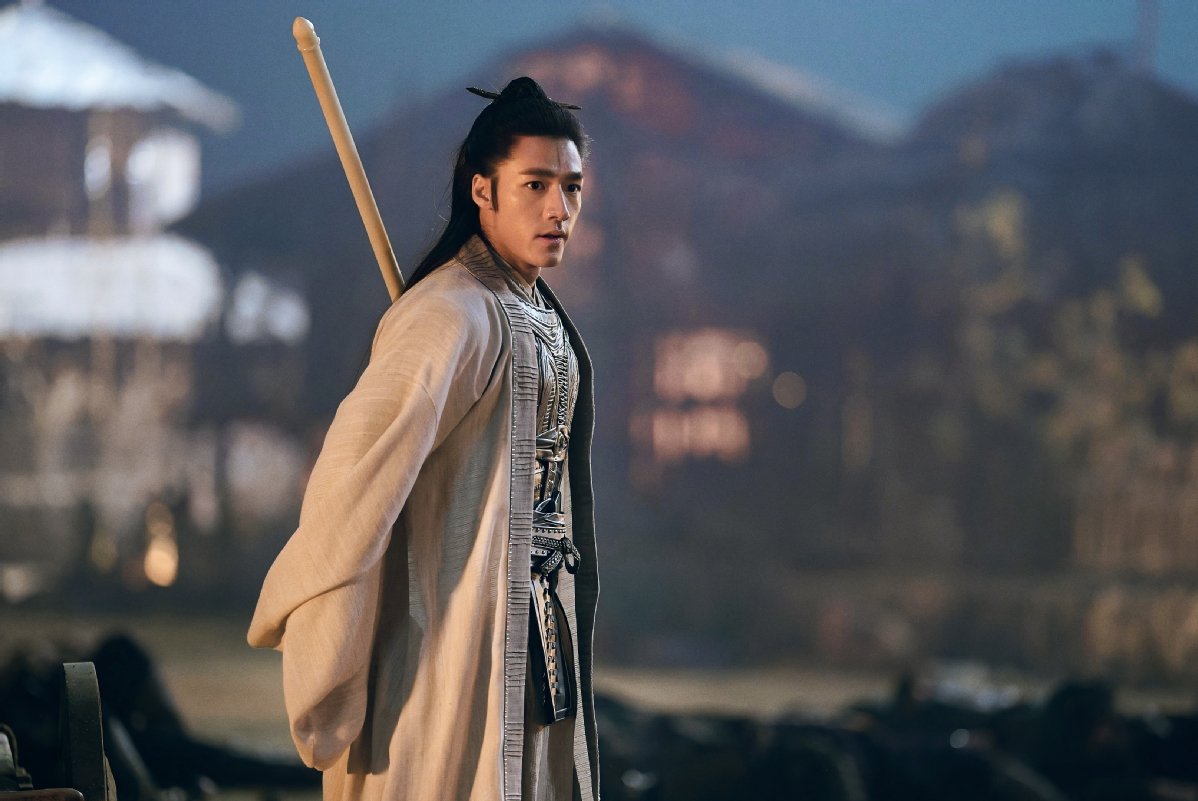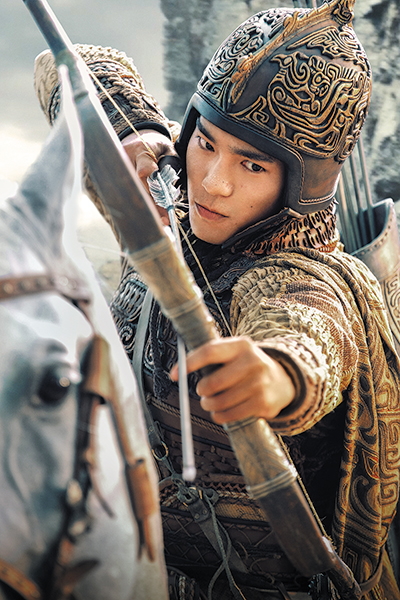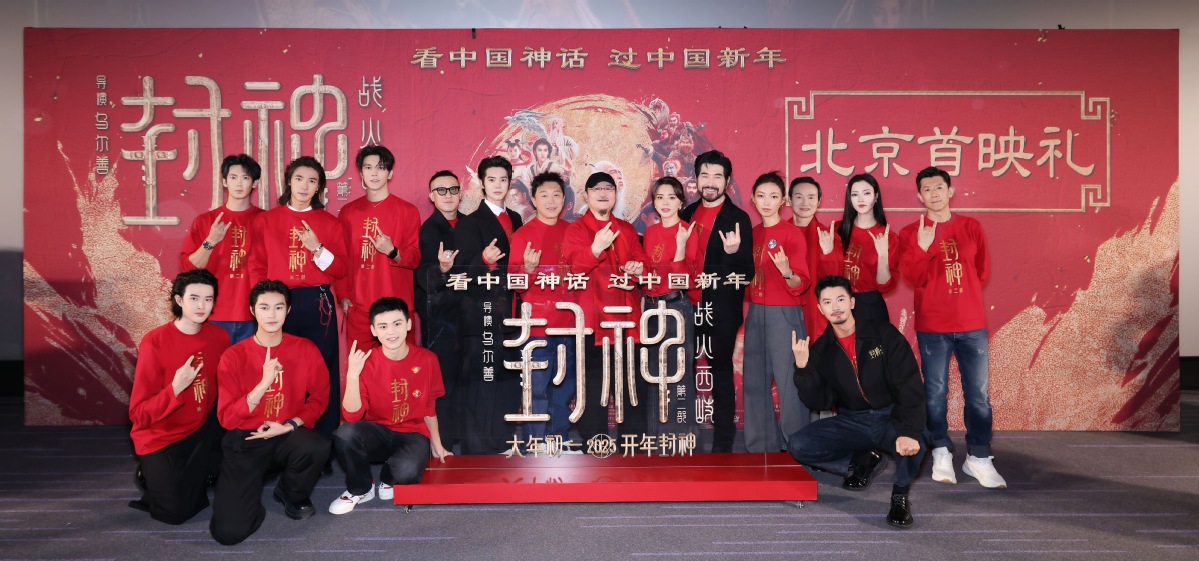China Daily 2025-02-06 09:57:13

Actor Ci Sha plays Yang Jian, a celestial being skilled in making use of elements like earth and water to create portals to move around swiftly. [Photo provided to China Daily]
A pioneer in visualizing the fantastic and magical worlds of Chinese mythology, Wuershan has devoted the most golden decade of his career to a single project.
Since deciding in 2014 to bring the grand spectacle of the Ming Dynasty (1368-1644) novel Fengshen Yanyi (The Investiture of the Gods) to life, the director has poured his passion and energy into Creation of the Gods, one of the most ambitious cinematic projects in the world's second-largest movie market.
Planned as a trilogy, the films also draw inspiration from Wuwang Fazhou Pinghua (King Wu Resists King Zhou), a novel written during the Song Dynasty (960-1279). Both tales detail a war 3,000 years ago to overthrow a tyrant, during which celestial beings and demons joined forces with humans.
A casting call was held between 2017 and 2018 to select young actors from a pool of 10,000 candidates. To prepare for their roles, they underwent six months of intensive training in skills ranging from horseback riding to martial arts stunts. The three films were shot consecutively to reduce costs and maintain continuity, such as avoiding changes to appearance, especially of the child actors.
In 2023, the first installment, Creation of the Gods I: Kingdom of Storms, rocked the summer market, raking in 2.63 billion yuan ($363.24 million) at the box office as a result of its captivating storytelling and engaging character arcs. It was also screened in 160 countries and regions around the world.
The highly anticipated sequel returned to the silver screen during the Spring Festival holiday in China and 17 other countries and regions, including France and Singapore.

Actor Yu Shi portrays Ji Fa, the warrior who leads an army of justice to fight against the tyranny of Yin Shou.[Photo provided to China Daily]
Modernized retelling
The new film, Creation of the Gods II: Demon Force, picks up where the first one left off with the resurrection of Yin Shou, a ruthless king played by Chinese-American actor Kris Phillips, known as Fei Xiang in China, who relies on the magic of Daji, a fox demon inhabiting the body of a beautiful woman, who is also his favorite concubine.
In the first movie, Yin uses the demon to murder his father and elder brother in a quest for supreme power, also condoning its decision to murder his queen and send his son to the guillotine. He also attempts to steal the Fengshen Bang, a divine scroll that enables its owner to dominate the world.
Yu Shi, who plays Ji Fa, the brave young son of Ji Chang, the lord of one of Yin's vassal states, resists the king's tyranny. He kills Yin and escapes to his homeland of Xiqi — a harmonious agricultural society. Upon being resurrected, Yin sends a powerful army to destroy Xiqi. Ji Fa is forced to face formidable opponents, among them General Deng Chanyu, who has followed her father into battle since she was a child, and Commander Wen Zhong, who has a third eye on his forehead and can use powerful magic to slaughter people.
"Fengshen Yanyi consists of 100 chapters, featuring hundreds of characters, which is considered quite typical from the perspective of Chinese literature. But if we want to captivate the audience within a two-hour-plus time frame, we need to make a choice and select the most interesting characters," Wuershan says.
As the daughter of a seasoned general, the character of Deng caught the director's attention for her representation of a brave female warrior, who reminded him of the legendary women of Chinese history, from Fan Lihua during the Tang Dynasty (618-907) to Mu Guiying and Liang Hongyu during the Song Dynasty.
He has given the character a more contemporary essence. Deng is intelligent, courageous and highly skilled in martial arts. In an early scene, she enlists a bunch of Xiqi farmers to help build a pontoon bridge across a river. Unsure of their loyalty, she sends a horse galloping across the bridge to test its sturdiness first.
"But what I want to explore is how an epic myth that has endured for centuries can still resonate with modern audiences. In the movie, you will see that Deng is not only loyal to her commander but also true to her heart. She fulfills her duty as a military officer while also respecting the lives of civilians," says Wuershan.
Ji Fa is also given a compelling character arc, maturing from a fresh young warrior into an exceptional military leader fighting for justice, as he shoulders the responsibility of protecting his homeland.
"He starts to see things differently and really gets what war is all about — why it's so important to bring everyone together to fight the enemy. The battlefield is a brutal place of bloodshed and sacrifice, which makes the idea of true justice even more powerful," Wuershan says.

Director Wuershan (center) and his cast members promote the Spring Festival blockbuster, Creation of the Gods II: Demon Force, in Beijing on Jan 29.[Photo provided to China Daily]
Technical progress
Widely viewed as a milestone in the progress of the domestic film industry, the Creation of the Gods franchise has recruited visual effect teams from all over the world.
With more than 1,900 visual effects shots, the sequel brings to life the immortal figure of Yin Shou's son Yin Jiao, the former crown prince executed by his brutal father. Resurrected by a celestial being, he becomes a giant with blue skin, red hair, three heads and six arms.
"We worked in Los Angeles for two weeks. The technology we used to create Yin Jiao is among the latest. It's called volumetric capture and adds realism to muscle movements and facial expressions. I think it'll feel fresh for the audience," says Wuershan.
Aside from computer technology, the shooting and post-production for the "Mojia Sijiang", four sibling giants each 12 meters tall and possessing magical weapons, was comparatively conventional.
He says that the character design for the four giants was inspired by Tang Dynasty painter Wu Daozi's Taoist silk scroll, Bashiqi Shenxian Juan (The Scroll of Eighty-Seven Celestial Beings). Makeup for the four tall actors playing the giants took four hours a day. Their scenes were shot at 36 frames per second, creating the illusion of slow, clumsy movement.
Other visually striking scenes include those featuring Lei Zhenzi, a green-skinned figure with giant wings capable of flight; Nezha, a child celestial being who wields a magical red ribbon as a weapon and flies on two blazing wheels; and Yang Jian, a celestial being skilled in making use of elements like earth and water to create portals to move around swiftly.
As Wuershan worked with the foreign visual effects artists, he compared Kunlun, a celestial realm inhabited by divine beings, to the moon. He came up with the premise that gravity on Kunlun was roughly half that of the moon, helping them to understand how to visualize the floating realm.
Phillips shares that he volunteered to write the English subtitles. "If we want to promote Chinese culture overseas, it requires translation to be done very accurately. I hope that Chinese films can pay more attention to the translation of subtitles," he says.
The actor watches new Chinese movies in London or New York but often gets frustrated with poor subtitles, fearing that foreign audiences may miss the cultural depth.
He hopes Chinese films will participate in more international festivals, helping global viewers appreciate the domestic industry's technical achievements and the cultural richness of Chinese stories.
As the film gears up for wider international release, Wuershan hopes it will give audiences worldwide a richer and deeper insight into the emotions and values that define the Chinese.
责编:冯宇轩
一审:冯宇轩
二审:唐煜斯
三审:秦慧英
来源:China Daily
我要问



 下载APP
下载APP 报料
报料 关于
关于
 湘公网安备 43010502000374号
湘公网安备 43010502000374号